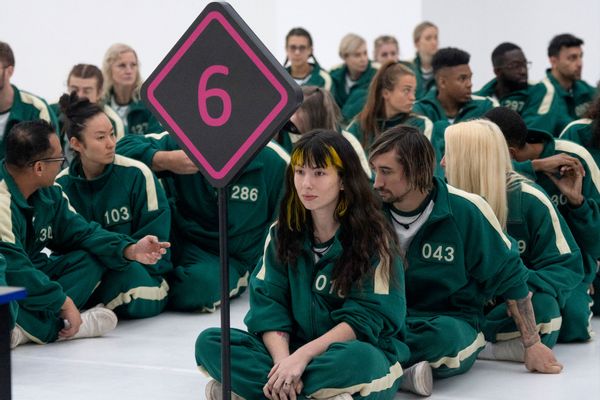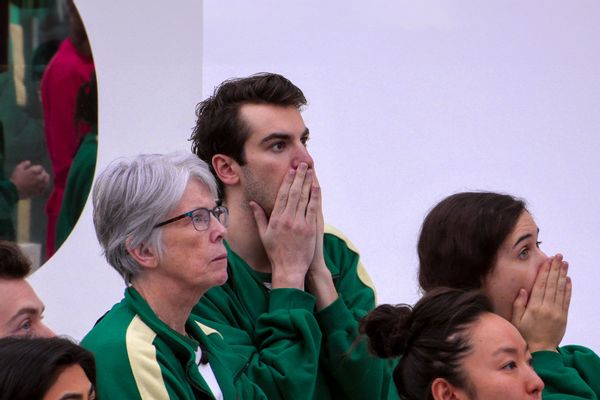The word of the year is “authentic”: “Squid Game: The Challenge” tests its definition in 2023
For my money, the image that defines the tragedy of Netflix breakout k-drama “Squid Game” occurs in its second episode after the deadly stakes of its competition game show have been revealed and the remaining contestants have been given the option to vote on whether to terminate the contest or to stay.
One woman steps up to the ballot stand and looks for a moment as if she’ll opt to cancel the game. Then she glances up at the piggy bank suspended above her filled with billions in South Korean currency – so much money, and so close! Given the choice between the sure thing of living under the weight of debt or an uncertain outcome, she votes on a chance to either get rich or die trying.
Its corollary in the reality competition series “Squid Game: The Challenge” occurs in the fourth episode and holds lower stakes merely by taking the possibility of violent murder off the table (thankfully). Nevertheless, it similarly conveys the unscripted reality show’s message to and about its audience by showing a well-liked character, a 69-year-old physician named Rick, reacting to receiving an unexpected boon with doubt, confusion and fear.
The people in charge at Netflix entirely missed the first season’s messages concerning late-stage capitalism’s exploitation of the masses.
Given the circumstances this is plausible. He’s dragged a new friend into a room and heartily, happily drawn him into an innocent game while forgetting there are no such face-offs here. When an announcer suddenly reminds him where he is, and one of the guards enters the room, Rick can’t even look at the guy’s masked face, gazing downward as he accepts his prize and not entirely believing his good fortune.
But he could simply be acting. A primary departure that “The Challenge” makes from the original scripted series is to include interview segments with competitors whose stories are worth following. Rick distinguishes himself by announcing his strategy is play the part of the lovable old man everyone underestimates, making him “The Challenge” version of Oh Il-nam (Oh Yeong-su), the elderly man who ends up being anything but harmless.
Among other nagging aspects of reality competition brought to the fore in “The Challenge” is the tendency for contestants to lay claim to a character to ensure they’ll get screen time, which is what the producers want and what their unreasonably wealthy bosses demand.
Rick is one of the many folks here playing the game within the game, the one that grants contenders the consolation prize of limited fame even if they don’t go home with the $4.56 million jackpot at the end of the 10th episode.
On the off chance that the gameplay has indeed revealed his truest character along with others, the audience is well familiar with how all reality competition productions are rigged to manipulate our emotions through hero and villain edits, including the preponderance of people who offer themselves up as pawns of the system for a shot at riches.
 Squid Game: The Challenge (Netflix)On Monday, Merriam-Webster declared “authentic” to be the word of the year for 2023, explaining in a statement that its choice was driven by stories and conversations related to artificial intelligence, celebrity culture, identity and social media. The company explained in a press release, “Although clearly a desirable quality, authentic is hard to define and subject to debate — two reasons it sends many people to the dictionary.”
Squid Game: The Challenge (Netflix)On Monday, Merriam-Webster declared “authentic” to be the word of the year for 2023, explaining in a statement that its choice was driven by stories and conversations related to artificial intelligence, celebrity culture, identity and social media. The company explained in a press release, “Although clearly a desirable quality, authentic is hard to define and subject to debate — two reasons it sends many people to the dictionary.”
Also to Netflix.
To allay confusion, “Squid Game: The Challenge” is a living antonym of authenticity in that it is one of the most thoroughly engineered reality competition shows on TV. Its production team, which includes folks partly responsible for bringing us “The Circle” and “Naked Attraction,” populates the beginning 456-person contender pool with a variety of would-be ringers, including a former “Survivor” contestant (Jessica Lynn “Figgy” Figueroa) and a former K-pop star (Joel Jay Lane).
Of those two Figgy plays among her competitors, claiming in her interview that she wants to offer a feeling of safety to people on this ride with her in the hopes they’ll do the same for her. It’s a considerate concept until we see her bark at someone before a difficult competition that they need to sacrifice themselves for the good of everyone else while making no moves to place herself in danger.
Nobody should be stunned to see the first five episodes of “Squid Game: The Challenge” perched atop the streamer’s most-watched titles right now given the worldwide popularity of “Squid Game” after its late 2021 release, along with the comical shock that met Netflix’s announcement of “The Challenge. Many cited the crassness of turning a drama about a deadly game show that exploits desperate people to entertain a handful of hyper-wealthy sociopaths into a real game show casting real people for the sake of entertainment. Many more agreed and are still watching to see how well Netflix pulls that off.
Sliced any way, that choice soberingly signals the people in charge at Netflix entirely missed the first season’s messages concerning late-stage capitalism’s exploitation of the masses. Executive producer Tim Harcourt claims differently in his interview with TV Guide; for him and the other EPs, he explains, “the anti-capitalist allegory is only one very small part of ‘Squid Game,’” much in the way “Star Wars” isn’t just about “swashbuckling rebels overtaking an empire.”
One undeniable aspect of reality television is that its most successful versions thrive on fakery tightly tailored to seem genuine.
Leaving that where it is, its success either demonstrates our ability to hold the drama’s cautionary tenet separately from whatever “The Challenge” is trying to achieve or, and this is more likely, that most people don’t care that much about keeping the “Squid Game” allegory sacrosanct as long as its offshoot makes us hoot out loud at how ugly people can be when millions of dollars hang in the balance . . . and by a few steel cables.
One undeniable aspect of reality television is that its most successful versions thrive on fakery tightly tailored to seem genuine. No drop of human drama hasn’t been ginned. No display of situational stress is left unheightened (allegedly helped along here by inhospitable and dangerous conditions, initially reported in Variety).
 Squid Game: The Challenge (Netflix)
Squid Game: The Challenge (Netflix)
The bargain producers and contestants make with the audience is that they will manufacture addictive drama – only, in this case, it’s the type that leaves us unsure as to how it defines it heroes or villains. Is it the chest-pounding bro who speaks his mind, reminds us that Jesus had to compete (!) and reveals he was raised by a single mother? Or are we simply meant to appreciate those who know how to create a good storyline, like Rick, or the mother-and-son team of Leann and Trey who claim to be there to share an adventure?
That motive may be true, especially given how Leann is and her hesitance to celebrate other contestants’ eliminations. Those who are unsuccessful at “The Challenge” don’t die, but know their time is up when an ink pack explodes on their chest, at which point they engage in a split-second community theater simulation of a death scene.
Tasteful, no?
Still, as Leann points out, these are people like her who came to this competition with hopes of winning, and as the numbers dwindle and the jackpot rises, more of the departed will be their friends.
Instead of this enriching the despair of “The Challenge,” which the original “Squid Game” distills into a pointed conclusion, it makes the viewing experience shallower and more irritating. We’ve seen all of these moves before on every show where motivated players aren’t there to make friends, etcetera, etcetera.
Want a daily wrap-up of all the news and commentary Salon has to offer? Subscribe to our morning newsletter, Crash Course.
“The Challenge” injects randomness and chaos into the mix that thwarts the most studious strategists, mainly by throwing people for a loop by changing up certain games and tossing psychological tests into its pressure cooker. And while these elements ensure a certain unpredictability, locking in the show’s addictiveness they are nevertheless aggravating, hinting at an outcome that may not necessarily be just or satisfying but merely fitting.
 Squid Game: The Challenge (Netflix)This is a show arriving in a time when anyone’s voice or likeness can be faked, defined by masses of people idolizing showmanship and bombast instead of prizing competency; when forceful, senseless destruction is prioritized over restraint, empathy and human decency; when trust is low and our expectations are generally lower. This could refer to the state of affairs in the United States or in Argentina or in the Israel or in many other governments and societies on the planet. Netflix has a global reach, making “The Challenge” available in all sorts of places where the definitions of heroism and villainy cannot be agreed on.
Squid Game: The Challenge (Netflix)This is a show arriving in a time when anyone’s voice or likeness can be faked, defined by masses of people idolizing showmanship and bombast instead of prizing competency; when forceful, senseless destruction is prioritized over restraint, empathy and human decency; when trust is low and our expectations are generally lower. This could refer to the state of affairs in the United States or in Argentina or in the Israel or in many other governments and societies on the planet. Netflix has a global reach, making “The Challenge” available in all sorts of places where the definitions of heroism and villainy cannot be agreed on.
In that framework “Squid Game: The Challenge” is still by no means an honest game show, but the shared emotional experience of absorbing it may certainly be one of the more authentic vicarious thrills going. The sentiment driving its existence sails wide from the original story’s point. That its creators correctly wagered that the wider audience wouldn’t care about that means it hits its bullseye.
The first five episodes of “Squid Game: The Challenge” are now streaming on Netflix. The next four episodes debut on Wednesday, Nov. 29 with the finale streaming on Dec. 6.
Read more
about this topic


